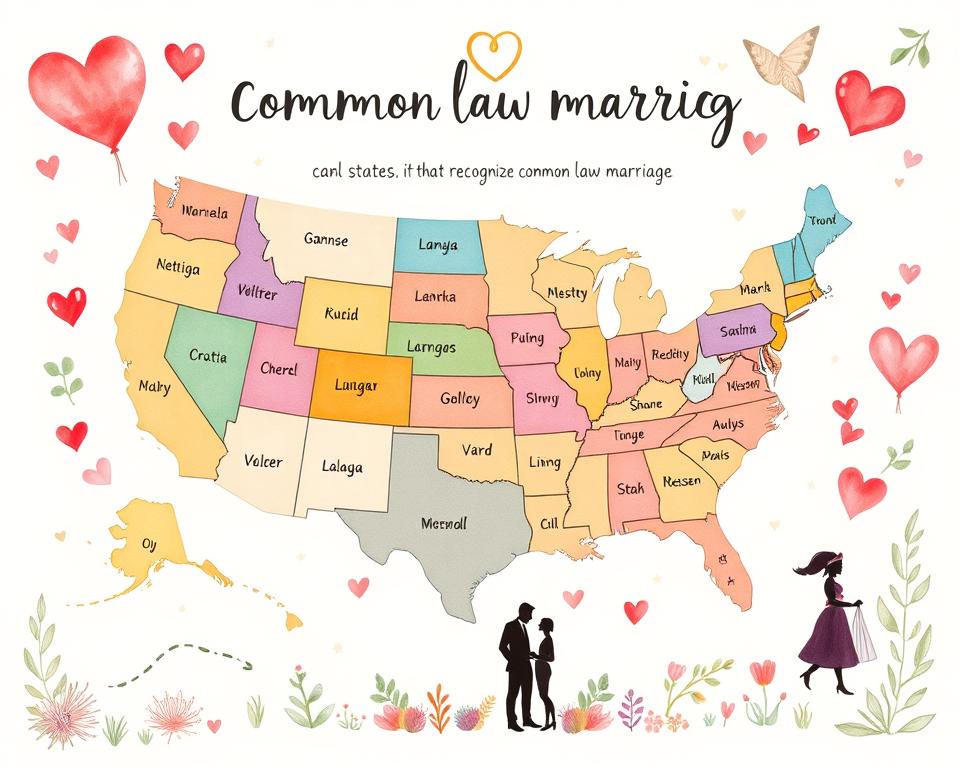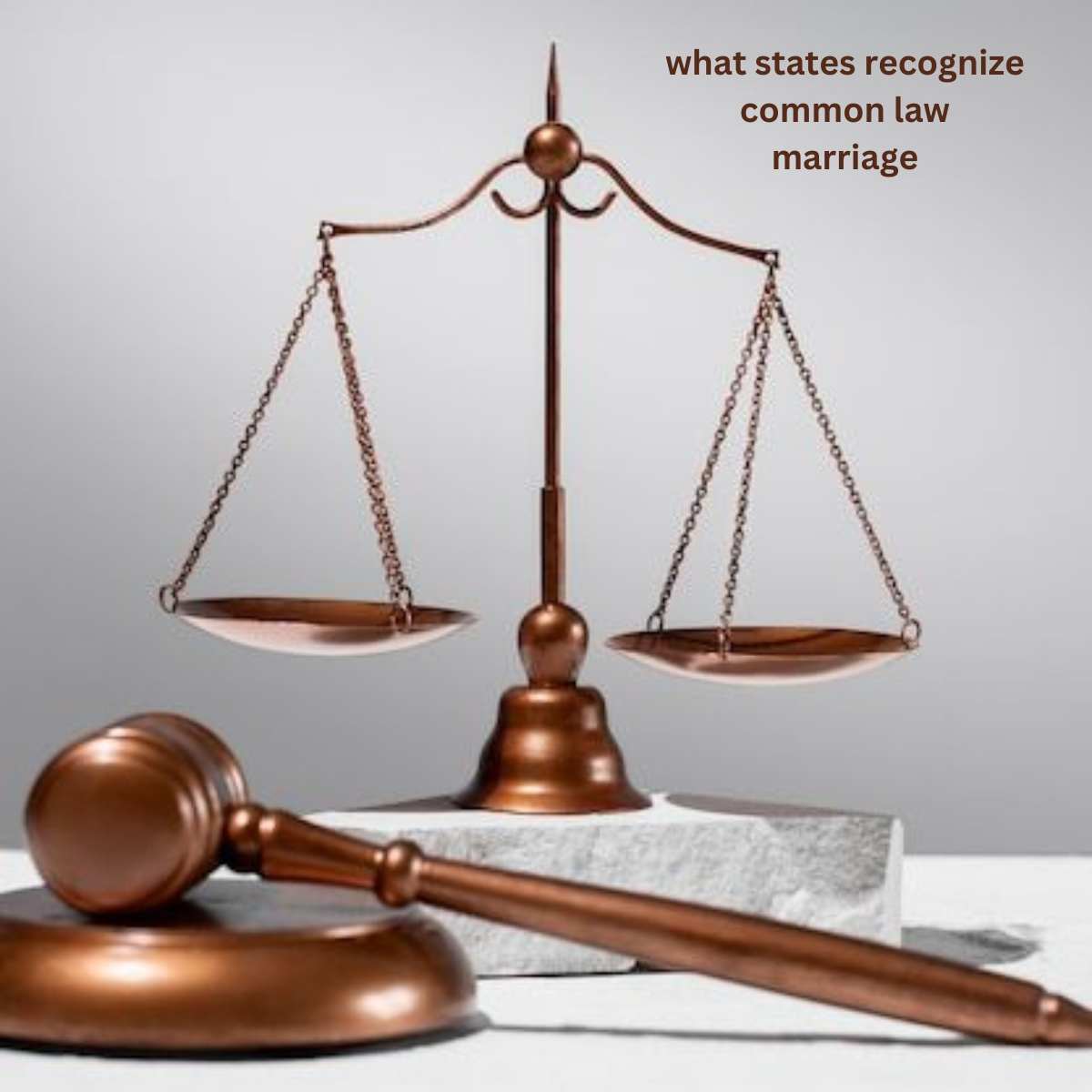Find out what states recognize common law marriage and the steps to legally establish this relationship. Our comprehensive guide provides the details.
What U.S. States Recognize Common Law Marriage?
Are you curious about states that recognize common law marriage? This type of union is acknowledged in 15 places, like Colorado and Alabama. It’s important for couples to know which states do, as it offers legal perks like insurance and joint tax filing.

In states that recognize common law marriage, couples enjoy the same rights as those who are formally married. But, the rules about common law marriage differ across the U.S. If you’re interested in learning more, keep reading.
Key Takeaways
- Common law marriage is recognized in 15 U.S. jurisdictions, including 7 states that fully recognize it and 10 states that partially recognize it.
- Couples in recognized common law marriages have the same legal rights as formally married couples, including the right to divorce.
- The laws and regulations regarding common law marriage vary across the U.S., with different recognition cutoff dates and requirements.
- Understanding what states recognize common law marriage is essential for couples who are considering this type of relationship.
- Common law marriage can provide couples with benefits such as insurance, joint tax returns, and inheritance.
- The process for dissolving a common law marriage is identical to conventional divorce proceedings.
- Same-sex couples in recognized common law marriages have the same legal rights as opposite-sex couples due to the Obergfell v. Hodges ruling.
Understanding Common Law Marriage in America

The idea of common law marriage comes from medieval Europe. There, couples lived together and acted like a married couple. This idea came to the United States and has changed over time. Now, common law marriage recognition is different in each state, with some states accepting it and others not.
In the United States, states with common law marriage have their own rules. For example, in Colorado, a couple is considered married if they live together, agree to be married, and are seen as a couple by others. Texas has its own rules too, like both partners must be 18 and they can prove their marriage in a few ways.
Some important facts about common law marriage in the United States include:
- Only a few states and Washington D.C. recognize common-law marriages.
- Common-law spouses in recognized states get many of the same benefits as married couples, like Social Security.
- These marriages must end with a divorce in states that recognize them.
States that recognize common-law marriage often require couples to live together for a long time, like 7 to 10 years. Also, common-law couples can get big tax breaks, like the American Opportunity Tax Credit and Earned Income Tax Credit.
To understand common law marriage in America, you need to know the different laws in each state. Knowing about common law marriage helps couples make smart choices about their lives and money together.
| State | Recognition of Common Law Marriage |
|---|---|
| Colorado | Recognized |
| Texas | Recognized |
| California | Not Recognized |
Current States That Recognize Common Law Marriage
Common law marriage laws differ from state to state. Some states allow it, while others do not. Currently, eight states recognize common law marriages: Colorado, Iowa, Kansas, Montana, New Hampshire, Texas, Utah, and the District of Columbia. Each state has its own rules for common law marriage, like mutual agreement and living together.
Two more states, Oklahoma and Rhode Island, also recognize common law marriages. It’s important to know that each state has its own rules. The rules can change, so it’s key to understand them well.
The following states recognize common law marriages:
- Colorado
- District of Columbia
- Iowa
- Kansas
- Montana
- New Hampshire
- Oklahoma
- Rhode Island
- Texas
- Utah

It’s vital for couples to know the rules of common law marriage in each state. They should also think about the good and bad sides of it. This includes how it affects things like inheritance and medical decisions.
| State | Recognition of Common Law Marriage |
|---|---|
| Colorado | Recognized |
| District of Columbia | Recognized |
| Iowa | Recognized |
| Kansas | Recognized |
| Montana | Recognized |
| New Hampshire | Recognized (limited circumstances) |
| Oklahoma | Recognized |
| Rhode Island | Recognized |
| Texas | Recognized |
| Utah | Recognized |
Legal Requirements for Common Law Marriage

To have a common law marriage, couples need to meet certain legal rules. These rules change from state to state. They usually include legal capacity to be married, intent to be married, cohabitation, and public representation as a married couple.
In Kansas, for example, couples must show they are married by doing things like filing taxes together. This is to prove they are in a common law marriage.
Some places, like Iowa and Montana, don’t need a certain time living together to be considered married. But, other states, like New Hampshire, only see common law marriage for things like inheritance. The District of Columbia needs both partners to agree and intend to be married.
Knowing these rules is key for couples wanting a common law marriage. It affects their common law marriage benefits and common law marriage rights.
Couples should know the rules in their state. They should also know the common law marriage benefits and common law marriage rights they might get. Meeting these rules helps make their relationship legally recognized as a common law marriage. This gives them important rights and protections.
Key requirements for common law marriage include:
- Legal capacity to be married
- Intent to be married
- Cohabitation
- Public representation as a married couple
By knowing these rules and the laws in their state, couples can start a common law marriage. They can make sure they get the common law marriage benefits and common law marriage rights they deserve.
How to Establish a Common Law Marriage
To start a common law marriage, couples need to meet certain criteria. They must have the legal right to marry, intend to be married, live together, and act like a married couple. The common law marriage establishment rules differ by state. Some states accept common law marriages after a set time of living together. Others need a formal marriage declaration.
The common law marriage procedures include living together for a certain time and acting like a married couple. In some places, couples must file a declaration of informal marriage. They also need to show they agree to be married, live together, and act like a married couple.
Important things to think about when starting a common law marriage include:
- Cohabitation duration: varies by state
- Requirement for mutual agreement to be married
- Public representation as a married couple
It’s vital to know the laws about common law marriage in your state. The rules and steps can be very different.
Starting a common law marriage can give couples the same rights as traditional marriages. This includes inheritance rights and spousal support. But, it’s important to understand the possible challenges, like when moving to a new state.
By learning about the common law marriage establishment process, couples can make smart choices. They can ensure they’re taking the right steps to have a valid common law marriage.
Rights and Responsibilities in Common Law Marriages
In common law marriages, couples have the same rights and duties as those who got married formally. This includes common law marriage inheritance rights. Problems can happen in probate court, like when there’s a fight over who gets what if the marriage status is questioned.
Couples in a common law marriage might get common law marriage tax benefits. This includes filing taxes together and getting inheritance rights. The Social Security Administration says common law marriages are okay for taxes, but only in states that allow them.
To make a common law marriage, you need to live together, act like a married couple, and share marital duties. The following states say yes to common law marriage:
- Alabama
- Colorado
- Kansas
- Rhode Island
- South Carolina
- Iowa
- Montana
- Oklahoma
- Texas
- Washington D.C.
It’s key for couples to know the laws about common law marriage. They should understand the good and bad sides, like tax perks and who gets what when someone dies.
| State | Recognition of Common Law Marriage |
|---|---|
| Colorado | Recognized through case law |
| Texas | Recognized as “informal marriage” |
| Utah | Recognized as “non-conventionally solemnized marriage” |
Interstate Recognition and Legal Complications
Common law marriage faces challenges when it comes to interstate recognition. Some states accept it, while others do not. All U.S. areas follow laws that make out-of-state marriages valid, even if they can’t be made legally in the U.S.
This rule means a common law marriage in one state is usually recognized in others, even if they don’t officially allow it. But, common law marriage legal implications can differ a lot from state to state. This can lead to legal issues.
Some important facts to know:
- Only 10 U.S. states officially recognize common law marriages.
- About 1% of the U.S. population is in a common law marriage.
- 40% of couples think living together for a while automatically makes them common law married.
Couples should really get to know the laws about common law marriage, if they’re thinking of moving. Common law marriage interstate recognition affects things like taxes, inheritance, and more.
To deal with these issues, couples should talk to a lawyer. This way, they can understand their rights and duties in their current state and any future state they might move to.
| State | Recognizes Common Law Marriage |
|---|---|
| Alabama | Yes |
| Colorado | Yes |
| Iowa | Yes |
| Kansas | Yes |
| Montana | Yes |
| New Hampshire | Yes |
| Oklahoma | Yes |
| Pennsylvania | Yes |
| South Carolina | Yes |
| Texas | Yes |
Common Myths and Misconceptions About Common Law Marriage
Many people don’t understand common law marriage well. There are common law marriage myths and common law marriage misconceptions everywhere. One big myth is that just living together makes you married. But, you also need to act like a married couple and live together.
Some common common law marriage misconceptions are:
- Thinking that all property bought together is split 50/50 when you split up
- Believing that living together for seven years automatically makes you married
- Thinking that common law spouses can automatically inherit things or make medical choices for each other
It’s key to know the laws about common law marriage myths and common law marriage misconceptions. This way, couples can protect their rights and interests. Knowing the good and bad of common law marriage helps couples make smart choices.
It’s important to know the truth about common law marriage misconceptions and common law marriage myths. This helps couples deal with the complex issues of common law marriage. They can make better choices for their relationship.
| State | Recognition of Common Law Marriage |
|---|---|
| Colorado | Recognized |
| Iowa | Recognized |
| Montana | Recognized |
| Kansas | Recognized |
| South Carolina | Recognized |
Dissolving a Common Law Marriage
Dissolving a common law marriage is like getting a traditional divorce. It needs formal divorce proceedings in states that recognize it. Couples must follow legal steps and show proof of their common law marriage.
In states like Colorado, Iowa, and Texas, dissolving a common law marriage starts with filing a divorce petition. You also need to provide documents that prove your marriage. The court then decides if the marriage existed and if it’s over.
Important things to remember when ending a common law marriage include: * Showing strong evidence of your common law marriage * Following the divorce process in your state * Getting a divorce decree to end the marriage * Knowing the good and bad sides of ending a common law marriage, like taxes and inheritance
It’s key to know the laws about ending a common law marriage in your state. It can be complex and take a lot of time. Getting advice from a good lawyer can make the process easier and more successful.
| State | Recognition of Common Law Marriage | Dissolution Process |
|---|---|---|
| Colorado | Recognized | Formal divorce proceedings |
| Iowa | Recognized | Formal divorce proceedings |
| Texas | Recognized | Formal divorce proceedings |
Alternative Options in Non-Recognition States
In states that don’t recognize common law marriage, couples have other choices. They can look into domestic partnerships or civil unions. These options give similar rights and benefits to common law marriage.
These alternatives offer many perks. For example, they can help with inheritance, taxes, and even Social Security benefits. They also provide health insurance and other financial advantages.
Some states without common law marriage offer domestic partnerships or civil unions. These options give many benefits, like:
- Inheritance rights
- Tax benefits
- Access to financial benefits like Social Security
- Health insurance benefits
Other common law marriage alternatives include cohabitation agreements or joint property ownership. These choices offer some benefits but might not have the same legal standing as common law marriage.
Choosing the right alternative depends on the couple’s specific needs. It’s key to know the laws in your state about domestic partnerships, civil unions, and other common law marriage alternatives. This way, you can make a well-informed decision.
| State | Recognition of Common Law Marriage | Alternative Options |
|---|---|---|
| Colorado | Recognized | Domestic partnerships, civil unions |
| Iowa | Recognized | Domestic partnerships, civil unions |
| Montana | Recognized | Domestic partnerships, civil unions |
| Non-recognition states | Not recognized | Domestic partnerships, civil unions, cohabitation agreements |
Conclusion: Making an Informed Decision About Common Law Marriage
Common law marriage can be a good choice for couples who want something different. But, it’s important to know the laws about it, mainly in states that allow it. This type of marriage can offer tax benefits and rights to inherit, but it can also cause problems when couples split up.
If you’re thinking about common law marriage, think about the good and bad sides. Talk to lawyers to make sure you’re making the right choice for you. Knowing about common law marriage helps you choose the best relationship for your future.
FAQ
What is common law marriage?
Common law marriage is a legal bond without a formal wedding or license. In some states, couples who live together and act like they’re married can be legally tied. This is true after a certain time period.
Which states recognize common law marriage?
Only a few U.S. states acknowledge common law marriage. These are Colorado, Iowa, Kansas, Montana, New Hampshire (for inheritance), Oklahoma, Rhode Island, South Carolina, Texas, and Utah.
What are the requirements for establishing a common law marriage?
Each state has its own rules for common law marriage. But, they usually need you to live together, act like a married couple, and intend to be married. Financial ties and having kids together might also count.
What are the benefits and drawbacks of common law marriage?
Common law marriage can offer tax benefits, inheritance rights, and an easy way to start a relationship. But, it might be hard to prove the marriage exists. It also lacks legal protections and can be tough to end.
How can a common law marriage be dissolved?
Ending a common law marriage is like a traditional divorce. You’ll need a legal separation or divorce. The exact steps vary by state.
What are the alternatives to common law marriage in non-recognition states?
In places that don’t recognize common law marriage, couples might look into domestic partnerships or civil unions. These offer some legal rights but aren’t the same as a formal marriage.
